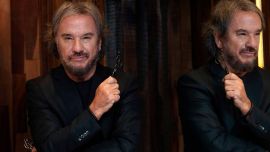Have you stopped to wonder by what means President Mauricio Macri has managed to stay in office? In relative comfort, in a country with a population historically accustomed to calling for the removal of the Executive, rather than waiting for the elected authority to complete its term in office? It is not an easy question to answer. The immediate rejoinder would be that the days of disruption and ousters are not so frequent any more.
The upheaval used to be part of trade union and military life, after the coup against General Juan Domingo Perón in September, 1955: nobody could live and enjoy comfort if they were not overthrowing somebody somewhere. Changing times have made space for a new angle in political confrontation. Relative to that, the digital magazine Nueva Sociedad last Monday ran an essay by Fernando Rosso titled: “The enigmatic political survival of Mauricio Macri.” The writer offers an interesting inventory as to why public patience, and hence why the country at large, are so indulgent with the president.
Bowing out, or being booted out, used to be normal practice. Former president Raúl Alfonsín (1983-1989) resigned six months short of his six-year term, beaten by economic failure (which led to Weimar-style runaway inflation) and daily confrontation with the trade unions – all of them. Interestingly enough, it was that most vigorous opponent of Alfonsín’s in the 1980s, trade union leader Saúl Edolver Ubaldini (1936- 2006) – and later national deputy 1997-2005, courtesy of Carlos Menem – whose enmity grew out of his opposition to the then-president’s deals with the International Monetary Fund (IMF). And yet it was Ubaldini, years later shortly before his death, who apologised to Alfonsín for undermining his government every single day of his term in office. Now, Alfonsín is remembered as a great president who had to lead the country into a lasting democracy after the dictatorship.
Previous to Alfonsín, between 1958 and 1962, then-president Arturo Frondizi was the man who drew almost weekly threats of a military coup (the generals called their action “planteos,” roughly translatable as an order to “face the problem”) – more than any other president had received in office. Frondizi’s term lasted just under four years, two years short of the constitutional six, when he was forced out. His successor, for a little over a year, was Senate leader José María Guido, who seized the presidency by right, rushing to the Casa Rosada with a notary to witness himself wearing the sash before a general could get there to try the same.
Then there’s country doctor Arturo U. Illia, who was elected president in 1963. General Juan Carlos Onganía decided that he did not like the doctor’s tie, or thought he could do the job better, and in June, 1966, two-and-a-half yearsf after Illia had taken office, the general ordered the president’s removal. He was pushed and shoved out of the door by a policeman.
However, even if here it seems to be slightly out of context, we also had president Carlos Saúl Menem staying in office for 10 years – a six-year first term under the old constitution and then four more years under the 1994 reform through which the La Rioja leader sought re-election one year later, benefitted by the new provisions. His was the longest stay in the presidential office in Argentine modern history (19thcentury governor Juan Manuel de Rosas excluded, because he was not a head of state).
Menem, of course, did his acquaintances some interesting favours and the beneficiaries included Kirchner Enterprises Inc, though they could not afford to acknowledge any assistance when eventually they took office. That corporation was initially in place for a first four-year term as from 2003, followed by an extended occupancy of two fouryear terms by the widow who took care of the family tenancy for another eight, making it 12 years in total. (Journalist Jorge Lanata once argued that the Kirchners had planned to stay in office for 16 years, and more, by taking turns.)
But that’s skipping ahead. After Menem came Córdoba conservative, Radical party politician and former senator Fernando de la Rúa, in 1999. He could not stay very long. He resigned at the insistence of his then-foreign minister, Adalberto Rodríguez Giavarini, when president and Cabinet could not face the upheaval outside in Plaza de Mayo and beyond which, around Christmas 2001, took nearly three dozen lives among protesters. The opposition parties – and probably De la Rúa’s own party – wanted him out.
Whether you like him or not, President Mauricio Macri is not likely to leave office without a desperate last round. In spite of the IMF’s first hand-out of some US$50 billion in June last year, expanded to US$56.3 million dollars in December last, the president and all his smart men and women seem to be on the skids and therefore here to stay, only up to December 10. Maybe ordinary citizens can’t react to circumstances where such unbelievable figures are quoted in the press and on television screens, as if the writers and media reporters knew what they were talking about. They can’t be; the figures are unbelievable to the ordinary citizen.
What we are all waiting for, to put the country to rights, is a successful grain harvest – soy and maize, mainly, but also the lower rated wheat – to turn the country’s economy around in the third quarter of this year. The previously quoted Fernando
Dosso argued in what seemed to be some bewilderment in the aforementioned essay that there were economists close to the governing party who continue to point to the hypothetical gains that the harvest, plus the Vaca Muerta new oil resources (where much development remains a future project), as a path to economic recovery. Dosso’s essay takes the reader through a maze of political disloyalties and betrayals, eventually quoting Communist theorist Antonio Gramsci’s concept of a “vanishing hegemony,” which reads as an apt Marxist definition of dwindling influence, not usually in view of any solution. Quite harrowing is Dosso’s conclusion that Macri’s political failure equates to a disaster for the Cambiemos coalition. He warns that a considerable portion of local businesses are now looking at alternatives, any will do, sort of, not excluding a distressing return to the Kirchnerite quarters led by Cristina Fernández de Kirchner.
At this point one can even believe the statement quoted in
part at the beginning, that the president of the Republic is
taking things easy. But that is while a vast, growing, public
refrain builds from reactions against anything that might
throw us back to 2000-2001. Everybody agrees that was such
a painful experience, it must be avoided at all costs.related news





















Comments